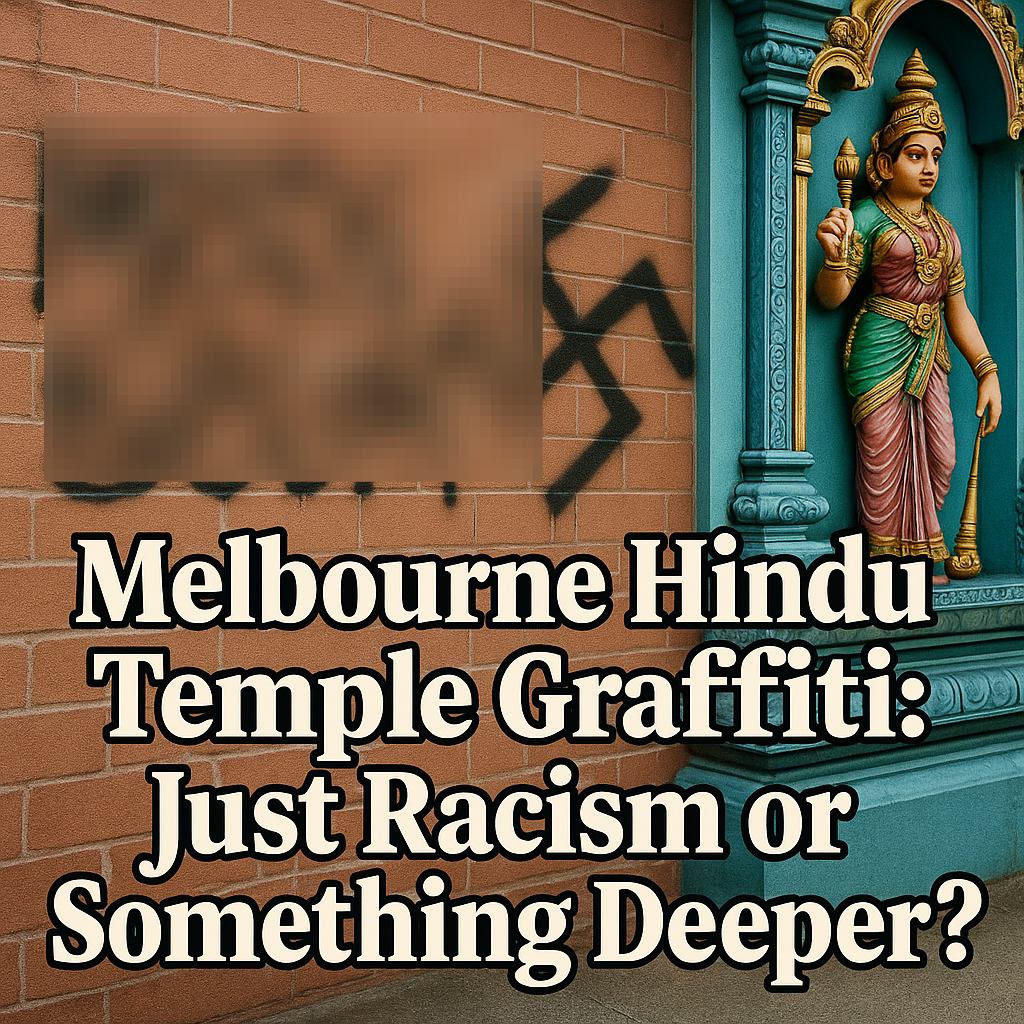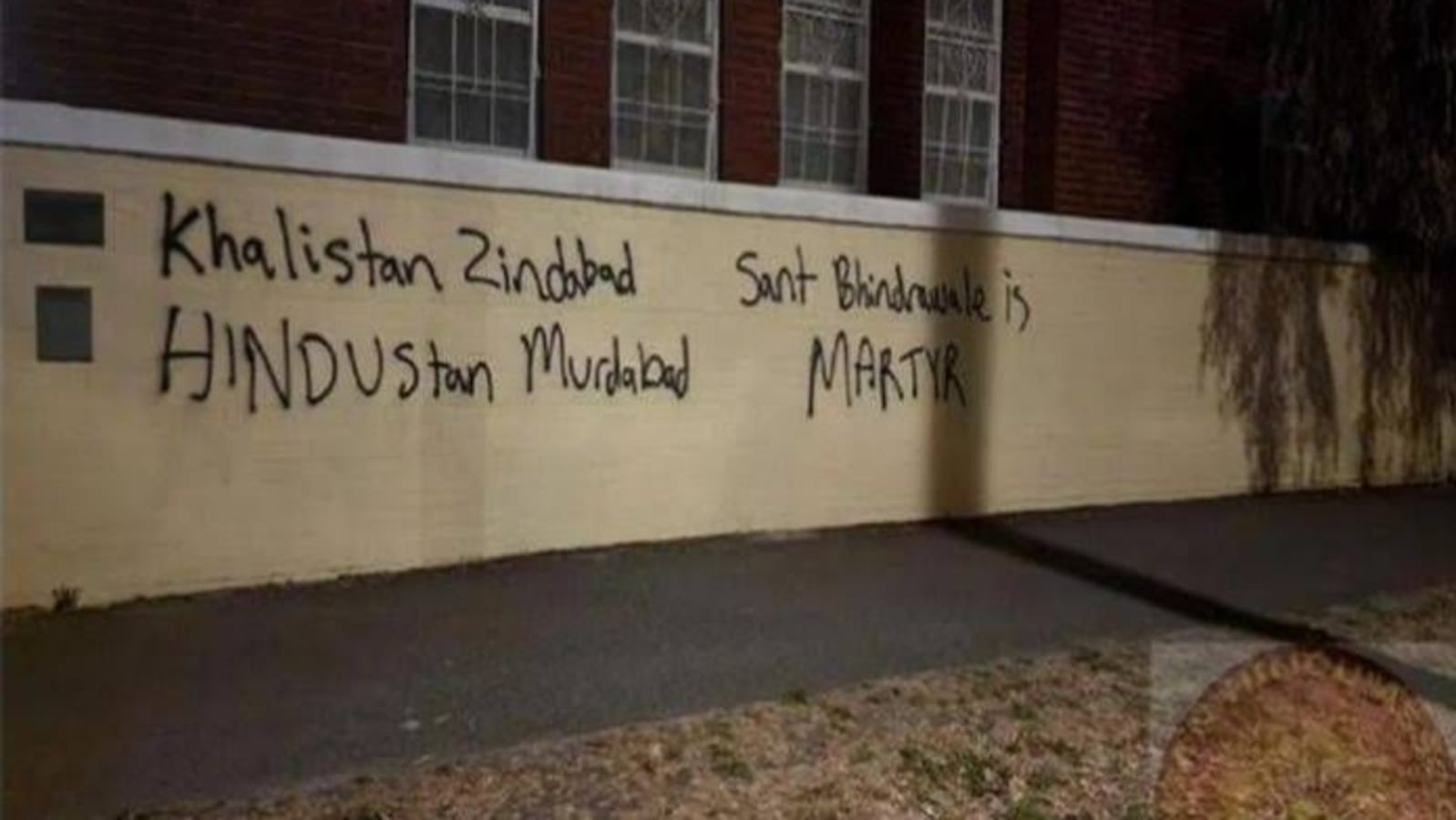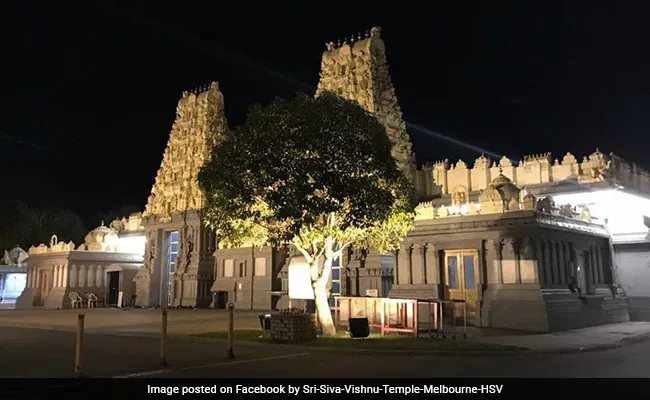Racism in Australia? Hindu Temple in Melbourne Vandalized With Hate Graffiti
Melbourne Hindu temple vandalized with racist hate graffiti, exposing rising Hinduophobia & religious intolerance in Australia. Explore the disturbing pattern of attacks, challenge multiculturalism's state, and analyze global reactions & security gaps. Urgent call for action.

Written by Lavanya, Intern, Allegedly The News
MELBOURNE, July 24, 2025
The recent vandalization of the Shree Swaminarayan Hindu Temple in Melbourne's Boronia suburb, defaced with racist graffiti on July 21, has sent shockwaves through Australia's Indian community and reignited urgent concerns about rising racism and religious intolerance across the nation. This isn't merely an act of petty crime; it's a stark manifestation of a deeper issue – the insidious rise of Hinduophobia and a disturbing pattern of religiously motivated crimes targeting minority faiths in Australia. The incident, where hateful messages like "Go Home Brown C**t" were spray-painted alongside slurs on two Asian-run restaurants, challenges the very fabric of Australia's self-proclaimed multicultural society.
This egregious act of hate has sparked widespread condemnation and prompted an immediate police investigation. Makrand Bhagwat, President of the Hindu Council of Australia, expressed profound heartbreak, stating, "Our temple is meant to be a sanctuary of peace, devotion, and unity. It's where we celebrate our faith and heritage. To have it targeted in this way feels like an attack on our identity, our right to worship and freedom of religion." Victorian Premier Jacinta Allan has also condemned the act as "hateful, racist and deeply disturbing," assuring the Hindu community that there is "absolutely no place for such behaviour in Victoria."
The Deeper Issue: Unmasking Hinduophobia
Hinduophobia, often defined as the fear of, hostility towards, or negative perceptions pertaining to the practitioners or religion of Hinduism, is a phenomenon that has seen an alarming increase globally, and Australia is no exception. While not always overtly recognized or documented as a distinct form of religious discrimination, incidents like the Melbourne temple vandalism undeniably point to its presence. Historically, the treatment of Hindus in Australia has been complex, from early anxieties about "paganism" and "caste evils" among Indian laborers to the "White Australia" policy, which severely restricted Asian immigration for decades. Even after the official abandonment of the "White Australia" policy in 1965, reservations about admitting people with "different standards of living, tradition, and culture" persisted, subtly shaping societal attitudes.
The Mapping Social Cohesion 2024 report revealed a concerning trend: a 2% increase in negative attitudes towards Hindus and an 8 percentage point decline in positive attitudes. This shift in public sentiment provides a fertile ground for the escalation of prejudice into overt acts of hate. The current incident in Melbourne, and others before it, underscore that Hinduophobia is not just an abstract concept but a lived reality for many in the diaspora.

A Disturbing Pattern: Recent Attacks on Temples in Australia
The vandalism in Boronia is not an isolated incident but rather fits into a disturbing pattern of attacks on Hindu temples and community members across Australia in recent years. While comprehensive national statistics specifically for anti-Hindu hate crimes are challenging to obtain due to varying reporting mechanisms, anecdotal evidence and community reports paint a grim picture.
- January 2023, Melbourne: The Swaminarayan Temple and ISKCON Temple in Melbourne, along with the Shri Shiva Vishnu Temple in Carrum Downs, Victoria, were defaced with anti-India and pro-Khalistan graffiti. These incidents triggered widespread condemnation from the Indian diaspora and calls for stronger action from Australian authorities.
- Adelaide, July 2025: Just two days prior to the Melbourne temple vandalism, a 23-year-old Indian student, Charanpreet Singh, was brutally assaulted in Adelaide, reportedly after a verbal altercation where assailants told him "f--- off, Indian." He suffered serious injuries, including brain trauma. While not a temple attack, it highlights a broader climate of racial intolerance impacting the Indian community.
- Melbourne, July 2025 (current incident): The Shree Swaminarayan Hindu Temple in Boronia, along with two Asian-run restaurants and a healing center, were targeted with racist graffiti including "Go Home Brown C**t." Initial police investigations suggest these four incidents are linked.
This repeated targeting of places of worship and individuals from the Indian and Hindu communities showcases a clear and disturbing pattern of religiously and racially motivated crimes, prompting serious questions about the state of multiculturalism in Australia.
Questioning Multiculturalism: A Tarnished Ideal?
Australia prides itself on its multicultural identity, with policies supporting cultural diversity dating back to the late 1970s. The 1978 Galbally report recommended the adoption of multiculturalism, and successive governments have reaffirmed this policy framework. However, the recurring incidents of hate crimes against minority faiths, particularly the recent temple vandalism, force a critical examination of how effectively these policies translate into genuine safety and inclusion for all communities.
Critics argue that while multiculturalism is celebrated in rhetoric, practical implementation and robust enforcement against hate speech and discrimination remain inadequate. The incidents expose a gap between policy and lived experience, where segments of the population still face prejudice and violence based on their race or religion. The Australian Human Rights Commission has highlighted that while laws exist, more needs to be done to encourage reporting and ensure communities feel safe.
Investigating Motives and Tensions
While Victoria Police have launched an active investigation into the Melbourne temple vandalism and linked incidents, the specific suspects and ideological motives remain under scrutiny. However, the nature of the graffiti ("Go Home Brown C**t") strongly suggests racial and xenophobic undertones. Some reports have linked previous temple vandalism incidents to pro-Khalistani elements, a separatist movement advocating for an independent Sikh state. However, in the current Melbourne incident, the presence of Hitler imagery alongside the racist slurs suggests a possible nexus with neo-Nazi or white supremacist ideologies, which have seen a worrying resurgence in some parts of Australia.
Political tensions, both domestic and international, can also contribute to the climate in which hate crimes flourish. While Australia strives for social cohesion, underlying anxieties about immigration, perceived cultural differences, and geopolitical events can be exploited by extremist groups to fuel intolerance.

Emotional, Cultural, and Political Reactions from the Indian and Hindu Communities
The emotional, cultural, and political reactions from Australia's Indian and Hindu communities have been profound. There is a palpable sense of hurt, betrayal, and fear. Many feel that their places of worship, meant to be sanctuaries, are no longer safe. This sentiment is particularly impactful for younger members of the diaspora, for whom these incidents can deeply affect their sense of belonging and identity in Australia. The desecration of a temple is not just property damage; it's an attack on their faith, heritage, and cultural roots.
Community leaders, like Makrand Bhagwat, have condemned the attacks unequivocally and called for greater vigilance and protection. There have been calls for interfaith solidarity to combat hate, with groups like the City of Greater Knox's Multifaith Network pledging support. Politically, the Indian High Commission is closely monitoring the situation, and Australian authorities, including Victorian Premier Jacinta Allan, have issued strong condemnations and promised action. The expectation from the Indian-Australian community is clear: swift justice for the perpetrators and concrete measures to prevent future occurrences.
Official Statements and International Context
Following the attack, both the Indian High Commission and Australian authorities have responded. While the specific statement from the Indian High Commission on this particular incident is not yet widely published, past incidents have seen strong diplomatic engagement. Generally, the Indian High Commission has expressed serious concern over such acts and emphasized the need for Australian authorities to ensure the safety and security of the Indian diaspora and their places of worship.
Victorian Premier Jacinta Allan has publicly condemned the attack, stating, "This wasn't just vandalism - it was a deliberate act of hate meant to intimidate and isolate. There is absolutely no place for such behaviour in Victoria." Victoria Police have launched an investigation into the four linked incidents of racist graffiti. These official responses are crucial in acknowledging the severity of the problem and reassuring affected communities.
This incident also resonates with a global need for safeguarding religious sites and prosecuting hate crimes effectively. The vandalization of religious sites, whether Hindu temples, synagogues, mosques, or churches, is a global phenomenon driven by various extremist ideologies.
Intersection of Race, Religion, and Immigration Anxieties
The Melbourne temple vandalism highlights the complex intersection of race, religion, and immigration anxieties in Australia's social fabric. As Australia continues to welcome immigrants from diverse backgrounds, including a significant Indian diaspora, underlying societal anxieties can manifest as prejudice. The graffiti directly targets both race and perceived immigrant status, linking them to a desire for exclusion.
The rise of online hate speech, misinformation, and the propagation of extremist ideologies can further exacerbate these anxieties, influencing individuals to commit hate crimes. The psychological impact on younger members of the diaspora is particularly concerning. Growing up in a country that champions multiculturalism, only to witness such acts of hate, can lead to feelings of alienation, fear, and a fractured sense of identity. They may question their place and belonging in Australia, despite being born and raised there or having chosen it as their home.

International Reaction and Security Gaps
The international reaction to such incidents is often swift, particularly from India. Social media platforms become a forum for outrage and solidarity, with hashtags condemning the acts gaining traction. Indian lawmakers and media often highlight these incidents, putting pressure on the Australian government to take decisive action. This international attention underscores the global nature of hate crimes and the interconnectedness of diaspora communities.
The repeated nature of these attacks also highlights potential security gaps for religious institutions abroad. Temples, often open and welcoming, can be vulnerable targets. Actionable steps religious institutions should consider include:
- Enhanced Surveillance: Installing high-quality CCTV cameras with clear night vision and secure storage.
- Community Watch Programs: Encouraging local community members to be vigilant and report suspicious activity.
- Collaboration with Law Enforcement: Establishing strong lines of communication with local police for rapid response and intelligence sharing.
- Security Assessments: Regularly conducting professional security assessments to identify vulnerabilities.
- Interfaith Dialogue: Fostering stronger ties with other faith communities to build collective resilience against hate.
Criticizing Legislation and Enforcement Failures
While Australia has laws against racial and religious discrimination, and recent amendments to the Criminal Code Act 1995 (Cth) have strengthened hate crime provisions, critics argue that existing legislation and enforcement mechanisms are often insufficient to deter such crimes effectively. The Australian Hate Crime Network, for instance, has proposed greater articulation of the Act's objectives to include recognition of both private and public harms and to ensure community confidence in online spaces.
Concerns exist regarding:
- Reporting Mechanisms: Underreporting of hate crimes due to a lack of trust in authorities or fear of further victimization.
- Prosecution Rates: The difficulty in proving hate motivation leads to lower prosecution rates for hate crimes compared to general crimes.
- Penalties: Whether current penalties are a sufficient deterrent. The new laws introduce harsher penalties and mandatory minimum sentences for certain offenses, including those related to Nazi symbols and obstructing access to places of worship.
- Online Hate: The porous relationship between online hatred and extremist movements, and the challenges of policing hate speech on digital platforms.
The Australian Human Rights Commission has also consistently opposed mandatory sentencing laws, arguing they can undermine judicial independence and disproportionately impact disadvantaged groups, but recent legislative changes have introduced them for some offenses.
A Global Trend: Linking Melbourne to Other Attacks
The Melbourne incident is, unfortunately, not an isolated phenomenon but part of a concerning global trend of temple attacks and anti-Hindu sentiment, particularly evident in countries with significant Indian diasporas.
- Canada: In late 2022 and early 2023, several Hindu temples in Canada, particularly in the Greater Toronto Area, were vandalized with anti-India and pro-Khalistan graffiti. These incidents caused significant distress within the Indo-Canadian community and prompted diplomatic exchanges between India and Canada.
- United Kingdom: In Leicester, UK, in September 2022, tensions between Hindu and Muslim communities escalated, leading to instances of vandalism targeting Hindu temples and community centers.
- United States: In early 2023, the BAPS Swaminarayan temple in Chino Hills, California, was defaced with anti-India graffiti. Similar incidents have been reported in other parts of the US, prompting condemnation from Indian-American organizations and calls for greater protection of religious sites.
This global pattern suggests that a complex interplay of geopolitical narratives, extremist ideologies, and rising xenophobia is contributing to an environment where religious minorities, including Hindus, are increasingly vulnerable to targeted hate crimes.
A Call for Unified Action
The vandalism of the Hindu temple in Melbourne serves as a stark reminder that racism and religious intolerance remain pressing issues, even in societies that champion multiculturalism. It is a clarion call for intensified efforts to combat hate crimes, both through robust legislation and proactive community engagement. The psychological impact on diaspora communities, particularly younger generations, cannot be overstated; their sense of identity and belonging is directly threatened. Moving forward, safeguarding religious sites, prosecuting hate crimes with unwavering resolve, and fostering genuine interfaith understanding are paramount. This requires a unified effort from government, law enforcement, religious institutions, and civil society to ensure that the promise of multiculturalism is not merely an ideal, but a lived reality for all.
Reflecting Forward
While we await the full details of the Melbourne temple vandalism, this incident serves as a stark reminder of the persistent challenges faced by minority communities.
How can we, as a society, move beyond condemnation to genuinely eradicate the roots of religious intolerance and racism? What concrete steps will Australia take to protect its diverse communities and ensure their places of worship are inviolable sanctuaries? And how can individuals actively contribute to fostering an environment where such hateful acts are unthinkable?
Sources
- Melbourne Temple Vandalism (July 2025): The Economic Times, Times of India, New Indian Express, and NDTV
- Recent Racist Attack (Adelaide, July 2025): The Economic Times, Times of India, and The Hindu
- Prior Temple Vandalism in Australia (Pattern): The Hindu and Hindustan Times
- Australian Laws & Government Response to Hate Crimes: Australian Human Rights Commission, WMD Law, Law and Religion Australia Blog, and Parliament of Australia's legislative summaries.
- Hinduophobia and Multiculturalism in Australia: Mapping Social Cohesion
- International Context of Temple Attacks: NDTV and Coalition of Hindus of North America (CoHNA)
- Hindustan Times
- NDTV
- Shree Swaminarayan Temple Melbourne official gallery




